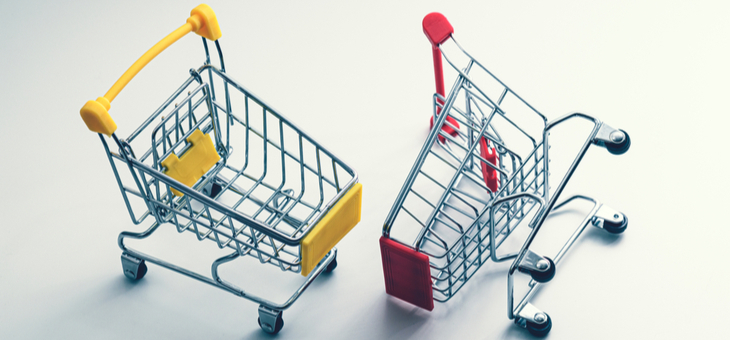Let’s face it, supermarkets benefitted from the pandemic.
You may have been locked down, but unless you were living in a bomb shelter, you would not have avoided images of shoppers, panicked, greedy and some way beyond sensible, stacking trolleys sky-high with toilet paper, canned goods, bottled water and sundries.
And if you thought those day were gone, think again.
They may not be panic buying at peak-pandemic levels, but in some areas, shoppers continue to stuff trolleys with as many (or much) beans, rice, pasta and toilet rolls than they did before the pandemic.
And, in terms of revenue growth, regional retailers are performing much better than metro outlets.
Why? “This could be because people are concerned about being exposed to the disease and so they are still stocking up on pantry items,” said BIS Oxford Economics chief Australia economist Sarah Hunter.
“It could also be that some of the products in this category are better substitutes for spending on food that would normally take place outside of the home or they’re treat items.”
Read more: Supermarkets, all retail and hospitality venues now require QR check-in
AMP Capital chief economist Shane Oliver thinks this trend may be indicative of the number of people heading to regional areas as the shift towards working from home and a “regional renaissance” intensifies.
“More people moving to regional Australia or least living and holidaying there now means stronger retail sales growth there,” said Dr Oliver.
Still, overall, supermarket sales have fallen since March 2020 when trolley stuffers emptied supermarket shelves during the pandemic’s peak.
And yet the latest Australian Bureau of Statistics data released on Monday shows grocery shopping levels remain higher than they were two years ago.
While regional outlets have thrived, those closer to the cities have experienced dwindling sales.
So how do supermarkets respond?
Coles and Woolworths have started a price war that will have only one winner.
You.
The supermarket giants have slashed prices on hundreds of products. That’s good news for your grocery bill, with savings to be had on everything from rice to roast pork.
Read more: Friendly Grocer wins Australia’s best supermarkets awards
Expect savings of up to 50 per cent on breakfast, lunch and dinner items, as well as snacks, hygiene and household cleaning products and pantry staples.
Coles is taking its infamous “Down Down” marketing spiel more seriously than ever, says spokesperson Martin Smithson.
“Since the start of the year, we’ve lowered the price of more than 500 products – and we’re not finished yet,” he said.
“With many Australians looking for ways to save money on regular purchases, we’ve lowered the cost of some of Australia’s most-enjoyed breakfast, lunch and dinner items to deliver even better value to our customers.”
Coles also announced an expanded convenience range over winter.
“We are seeing a trend of customers wanting affordable convenience, and we’ve responded to this by doubling our range of ready-to-heat and ready-to-eat meals at Coles,” said Mr Smithson.
Woolworths returned fire with price reductions across almost 220 products, including pork, chicken and soup, and savings of up to $10 on bulk rice bags and coffee.
“The prices dropped represent our commitment to giving customers the most value each time they shop with us, and covers a range of winter essentials, making roasts, warm beverages, bakeware, storage and medicine more affordable,” Woolworths spokesperson Paul Harker told TND.
The price war is expected to last for a short time, with Coles’ savings lasting until the end of July and Woolworths’ cuts continuing throughout August.
While Coles and Woolworths exchange salvoes, a newer retailer plans to attack them from the flank.
Read more: Aussie supermarkets named and shamed as junk food pushers
Since September 2020, discount retailer Ten Tops has quietly built a cult following, with superstores that don’t sell anything over $10.
With three stores open across NSW, and two more on the way, the retailer’s heavy discounts have already attracted a bundle of budget-conscious shoppers.
“The communities really seem to be embracing it and find really great value,” marketing manager Isabella Bernardi told news.com.au.
“We were overwhelmed with the support in the first couple of weeks, so much so that the locals pretty much stripped the shelves,” she said.
“Having that level of interest was really exciting for us, especially with it being our first store. It allowed us to be really well prepared for our Canberra and Wagga openings.”
The chain is owned by 50-year-old company the Bernardi Group, and sells everything from homewares, gardening and pet care products to frozen foods, party and stationery supplies, health and beauty products – even cleaning supplies, tools and automotive goods.
“We don’t necessarily market as a grocery store, so it’s not like you could come and get bread and milk, but there is a big grocery offering there,” said Ms Bernardi.
Ten Tops sold a very specific line of items it can buy at low wholesale prices, she said.
“The buyers focus on product that naturally is a lower price point and strike competitive deals with our suppliers.
“It’s also focusing on products that are going to be of worth but aren’t $300.”
The Bernardi Group uses its 50 years of retail experience to find great wholesale deals and pass them on to sellers.
“We understand how important good value is to our customers and there is certainly some competition among our team on who can find the best deals – especially when it comes to everyday products,” said co-CEO Joseph Bernardi.
Have you heard of Ten Tops? What are your supermarket savings tips? Why not share them with our members in the comments section below?
If you enjoy our content, don’t keep it to yourself. Share our free eNews with your friends and encourage them to sign up.

